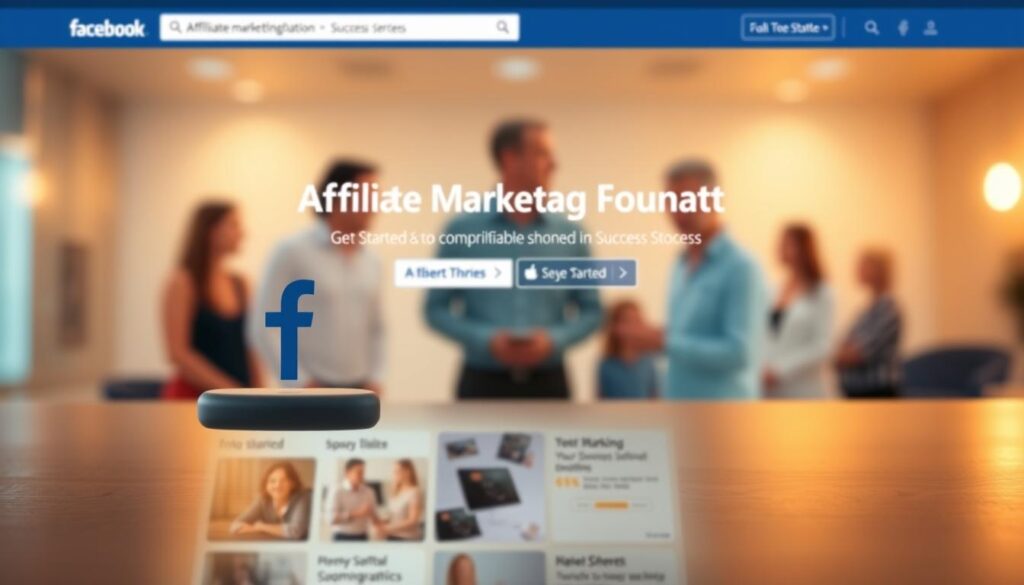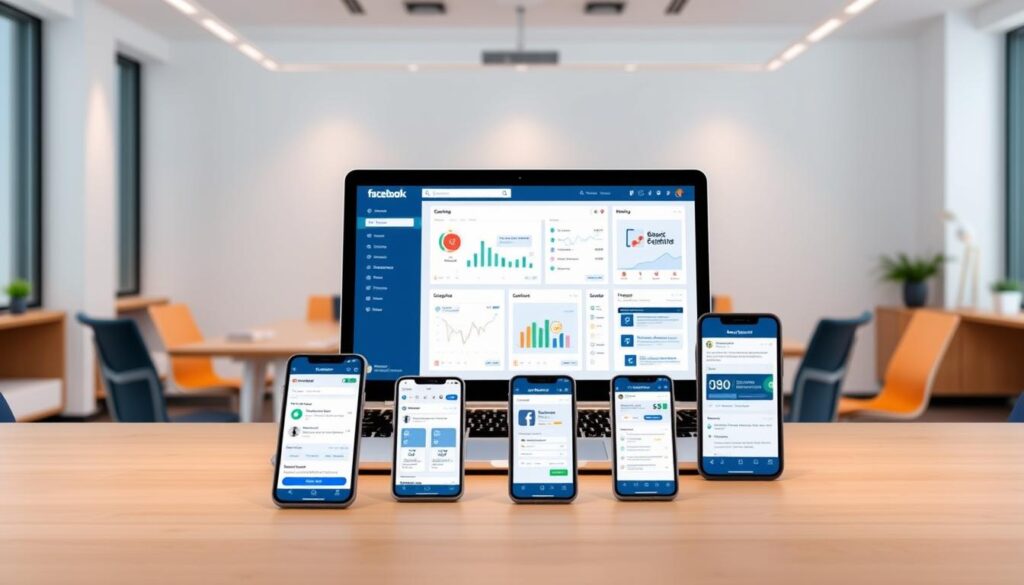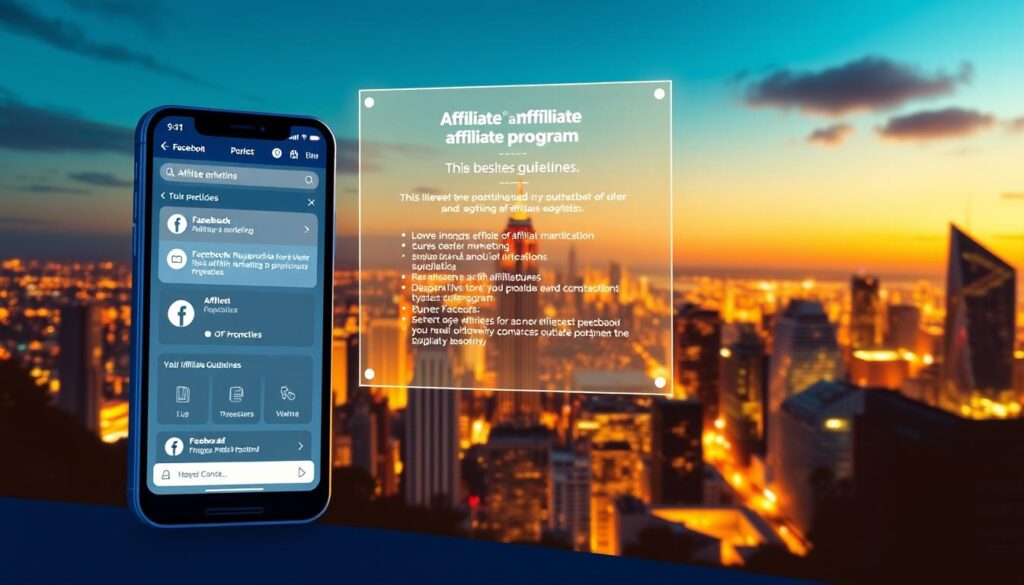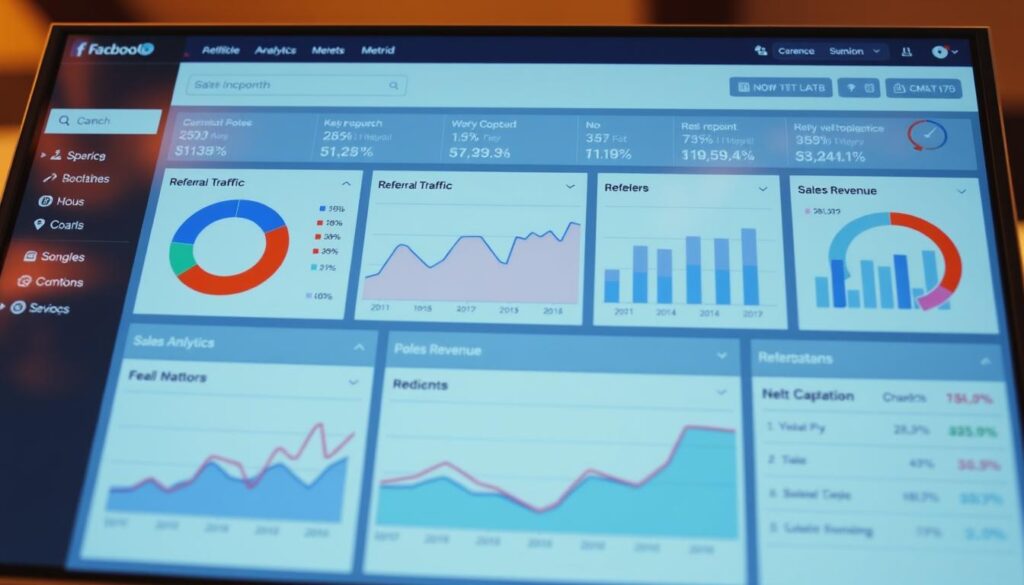Digital entrepreneurs are finding new ways to make money on Facebook. With over 2.8 billion active users, it’s a great place for affiliate marketing. This can lead to a big income.
Affiliate marketing is changing, offering new ways to reach people. Companies like MakeMeStylish have grown a lot. They use Facebook’s ads to reach more people.
Today, affiliate marketers can target specific groups of people. They use Facebook’s tools to make ads that work well. By understanding Facebook’s algorithms, they can make their marketing better and get great results.
Key Takeaways
- Leverage Facebook’s massive 2.8 billion user base for affiliate marketing
- Utilize advanced targeting tools for precise audience engagement
- Explore diverse content formats to maximize conversion rates
- Implement data-driven marketing strategies
- Stay adaptable to Facebook’s evolving platform features
Why Facebook Remains a Powerhouse for Affiliate Marketing in 2025
The digital marketing world keeps changing, and Facebook leads the way in affiliate marketing. It has over 2.9 billion users every month in 2025. This gives marketers a huge chance to reach people all over the world.

Facebook’s reach is more than just its user numbers. It has a complex system that helps marketers find the right people to talk to.
Global Reach and User Demographics
Knowing who uses Facebook is key for good affiliate marketing. Here are some stats that show why:
- 3.07 billion monthly active users worldwide
- 2.11 billion daily active users
- Strong engagement across multiple generational demographics
- Significant buying power among Millennials, Gen X, and Boomers
Algorithm Updates and Engagement
Facebook’s algorithm has changed a lot. Now, it focuses on content that really connects with people. Engagement-driven content is what’s in, making marketing more real.
“In 2025, successful affiliate marketing is about creating genuine connections, not just pushing products.”
Advanced Targeting Capabilities
Facebook’s tools for finding the right people have gotten better. Marketers can now target very specific groups based on:
- Detailed demographics
- Specific interests
- Precise behavioral patterns
- Advanced AI-powered predictive analytics
With AI and new tech like Augmented Reality (AR) and Virtual Reality (VR), Facebook keeps giving marketers the best tools. They can now find and talk to their perfect audience with amazing accuracy.
Setting Up Your Foundation for Facebook Affiliate Success
Creating a strong Facebook business page is key to your affiliate marketing strategy. With nearly 3 billion active users worldwide, Facebook is a top platform for building your social media presence. It helps you connect with potential customers.

To start a successful affiliate marketing journey, you need a compelling Facebook business page. This page should attract your target audience. Here are the main steps to get started:
- Choose a professional profile picture that represents your brand
- Create an engaging About section that highlights your unique value proposition
- Set up strategic call-to-action buttons
- Develop a content strategy aligned with affiliate marketing goals
“Your Facebook business page is more than just a profile – it’s your digital storefront and connection point with potential customers.”
Successful affiliate marketers know the importance of balanced content. They follow the 80/20 rule: 80% engaging, educational content and 20% promotional material. This strategy builds trust and keeps your audience interested.
| Content Strategy Element | Recommended Approach |
|---|---|
| Informative Posts | 80% of content |
| Promotional Content | 20% of content |
| Engagement Rate Target | High interaction and value |
Facebook’s advertising platform allows precise demographic targeting. This can boost your potential return on investment. By creating a strategic Facebook business page, you’ll lay a solid foundation for your affiliate marketing success.
Essential Tools and Features for Facebook Affiliate Marketing
Facebook affiliate marketing needs a strong toolkit. This toolkit helps marketers make, track, and improve their campaigns. The right tools can make your marketing strategy stand out.

Today’s affiliate marketers must have a full plan to succeed on Facebook. They need tools that make creating content, analyzing data, and managing campaigns easier.
Facebook Business Manager: Your Central Command
Facebook Business Manager is key for affiliate marketing. It lets marketers:
- Manage many Facebook pages and ad accounts
- Control who can access what
- Keep all marketing in one place
- Keep business safe
Advanced Analytics and Tracking Tools
Good data is crucial for affiliate marketing. The right analytics tools give you important insights on how your campaigns are doing.
| Tool | Key Features | Best For |
|---|---|---|
| Facebook Insights | Audience demographics, engagement metrics | Native performance tracking |
| Google Analytics | Detailed conversion tracking | Comprehensive website performance |
| SEMRush | Keyword research, competitor analysis | Strategic marketing insights |
Content Creation Platforms
Good content is at the heart of affiliate marketing. Use these platforms to make eye-catching visuals and posts:
- Canva: Drag-and-drop design tool
- Adobe Spark: Professional-quality graphics
- Grammarly: Content editing and optimization
“The right tools can turn an average affiliate marketer into a digital marketing powerhouse.” – Digital Marketing Expert
With Facebook’s huge 3.03 billion active users worldwide, affiliate marketers have a big chance to reach and connect with people. By learning these essential tools, you’ll be ready to make, track, and improve your Facebook affiliate marketing campaigns.
Building Your Facebook Business Presence
Creating a strong Facebook business presence is key for affiliate marketers. It helps grow your audience and increase brand awareness. With over 2.8 billion active users, Facebook is a great place to connect with potential customers and show off your affiliate marketing strategy.

To succeed on Facebook, you need a solid strategy. Here are some important steps to build a strong online presence:
- Post regularly to keep your audience interested
- Create different types of content that are valuable
- Use Facebook’s features like Stories and Live videos
- Talk directly with your followers
“Content is king, but engagement is queen.” – Mari Smith, Social Media Expert
Knowing your audience is essential. Facebook Insights gives you important data to improve your content. By looking at how your posts do, you can make your content better to reach more people and get more interaction.
| Content Type | Engagement Rate | Recommended Frequency |
|---|---|---|
| Video Posts | 85% higher | 2-3 times per week |
| Image Posts | 53% more likes | 3-4 times per week |
| Live Videos | Higher interaction | 1-2 times per month |
Follow the 80/20 rule: Share 80% valuable content and 20% promotional stuff. This builds trust and keeps your audience interested without feeling like they’re being sold to all the time.
Use Facebook Groups to build a community around your brand. These groups offer a chance for organic reach and deeper connections with people who are interested in your affiliate products.
Creating High-Converting Content Strategies
Successful affiliate marketing on Facebook needs compelling content that grabs attention and boosts sales. Content marketing has changed, requiring smarter ways to connect with users.

Today’s affiliate marketers know storytelling is key in digital marketing. By telling stories that hit home with your audience, you turn simple product ads into memorable experiences.
Content Types that Drive Engagement
- Product review videos
- Testimonial-based posts
- Informative tutorial content
- Behind-the-scenes glimpses
- User-generated content showcases
Storytelling Techniques for Affiliate Marketing
Good storytelling in affiliate marketing means being real and touching hearts. Sharing personal stories can make your marketing more powerful and relatable to your audience.
“People don’t buy products, they buy stories and emotions attached to those products.”
Visual Content Best Practices
| Content Type | Engagement Rate | Recommended Usage |
|---|---|---|
| Video Content | 30% Higher | Short, value-driven clips |
| Infographics | 35% More Shares | Complex information visualization |
| High-Quality Images | 40% More Interaction | Product demonstrations |
Visual content is crucial for affiliate marketing success. Using top-notch images, engaging videos, and eye-catching graphics can greatly increase interaction and sales potential.
Affiliate Marketing on Facebook: Best Practices and Guidelines

Facebook is a big place for affiliate marketers, with over 3 billion users every month. It’s a great chance to find new customers. But, you need to follow Facebook’s rules to do well and stay safe.
“Transparency is the cornerstone of successful affiliate marketing on social platforms.” – Digital Marketing Experts
Knowing the rules for affiliate marketing is key. The Federal Trade Commission (FTC) says you must tell people you’re an affiliate. This keeps things fair and honest.
- Always disclose affiliate relationships prominently
- Use clear language about potential earnings
- Avoid misleading claims about products
- Follow Facebook’s content guidelines strictly
Being open about your affiliate ties is important. It helps you build trust with your followers. Marketers should be clear about their connections.
| Disclosure Practice | Recommended Action |
|---|---|
| Affiliate Link Disclosure | Use #ad or #sponsored tags |
| Product Recommendation | Explain personal experience honestly |
| Earnings Disclaimer | Provide realistic income expectations |
Good affiliate marketers on Facebook make smart content and target the right people. By following the rules and being real, you can make a good living from affiliate marketing.
Leveraging Facebook Groups for Affiliate Marketing
Facebook groups are a great way for affiliate marketers to connect and make money online. With 2.96 billion users every month, they offer big chances for making money and growing your audience.

To build a strong community, you need to mix value with marketing. It’s about creating a real place where people can talk and share, not just buy things.
Building an Engaged Community
Starting a successful Facebook group takes planning and hard work. Here are some key steps:
- Choose a specific niche for your group
- Make clear rules for the community
- Use fun content to get people involved
- Thank members for their contributions
Group Management Strategies
“Your group’s success depends on creating value, not just selling products.”
Managing a group well is more than just keeping things in order. It’s about understanding your members and making them feel safe and valued.
| Strategy | Impact |
|---|---|
| Weekly Challenges | Increases Member Interaction |
| Expert Q&A Sessions | Provides Valuable Insights |
| Exclusive Member Discounts | Enhances Perceived Value |
Monetization Techniques
When it comes to making money from your group, you have to be careful. Stick to the 80/20 rule: 80% engaging content and 20% sales pitches. This way, your marketing feels natural and trustworthy.
Pro tip: Choose high-quality affiliate links that really help your members, not just overwhelm them with choices.
Advanced Facebook Ad Strategies for Affiliates

Facebook ads are a big deal for affiliate marketers. With 2.7 billion users, it’s a huge chance to find new customers. Using smart ad strategies is key.
“Success in Facebook advertising isn’t about spending more, but spending smarter.” – Digital Marketing Expert
Here are some top Facebook ad strategies for affiliates:
- Leverage Advantage+ campaigns for AI-driven ad optimization
- Implement precise conversion tracking mechanisms
- Utilize custom and lookalike audiences for targeted reach
- Develop multi-stage ad funnels
Facebook ads are great for targeting the right people. You can choose who sees your ads based on what they like and do. This makes your ads more effective.
Key Performance Metrics to Monitor:
- Impressions
- Click-through rates
- Conversion rates
- Return on ad spend (ROAS)
Testing your ads is important. Try different versions to see what works best. Aim for 80% valuable content and 20% promotions.
Retargeting is another smart move. It helps you reach people who’ve seen your content before. This can turn them into customers.
Targeting and Retargeting Techniques
Digital marketers can unlock powerful audience engagement strategies through sophisticated targeting techniques on Facebook. The platform offers unprecedented opportunities to connect with potential customers using advanced audience segmentation methods.

Facebook’s targeting capabilities allow affiliate marketers to create highly precise advertising campaigns that speak directly to specific audience segments. Understanding these techniques can dramatically improve marketing performance and conversion rates.
Custom Audience Creation
Custom audiences provide a strategic approach to reconnecting with users who have previously interacted with your brand. Marketers can leverage several key methods:
- Website visitor tracking using Meta pixel
- Engagement-based audience segmentation
- Retargeting users within a 30-day interaction window
Lookalike Audience Optimization
Lookalike audiences enable marketers to expand their reach by targeting users with similar characteristics to existing customers. This powerful technique helps businesses:
- Identify potential high-value customers
- Increase campaign efficiency
- Reduce acquisition costs
Behavioral Targeting Methods
Behavioral targeting allows precise audience selection based on specific user actions and interactions. The most effective strategies include:
| Targeting Method | Key Characteristics | Conversion Potential |
|---|---|---|
| Cart Abandonment Targeting | Users who added items but didn’t purchase | High (69% cart abandonment rate) |
| Website Interaction Tracking | Users who visited specific pages | Medium to High |
| Engagement-Based Targeting | Users who interacted with previous ads | High |
“Precision in targeting transforms potential impressions into meaningful customer connections.” – Digital Marketing Insight
By implementing these advanced targeting techniques, affiliate marketers can create highly personalized campaigns. These campaigns dramatically improve engagement and conversion rates.
Compliance and Legal Considerations

Facebook affiliate marketing needs careful attention to many laws. In 2025, digital marketing must be transparent and ethical.
“Compliance is not just a legal requirement, it’s a trust-building mechanism with your audience.” – Digital Marketing Ethics Board
Affiliate marketers must follow FTC guidelines and legal rules to stay credible. Key areas include:
- Clear affiliate disclosures in every promotional content
- Transparent communication about commercial relationships
- Adherence to platform-specific marketing regulations
- Protecting consumer privacy rights
When making affiliate content, use clear disclosure strategies:
- Use explicit statements like “I earn commissions from purchases made through these links”
- Include disclosures at the beginning of content
- Make disclosures easy to see and read
For 2025, knowing laws in different places is crucial. GDPR for EU citizens, CCPA for California residents, and specific national guidelines need thorough compliance plans.
Use tools to check for compliance, keep detailed records, and stay up-to-date with new rules.
“Non-compliance can cost more than potential commissions – it can destroy your entire affiliate marketing business.” – Digital Marketing Compliance Expert
Stay informed, be open, and always put your audience’s trust first.
Measuring Success and Analytics
Tracking your Facebook affiliate marketing performance needs a smart plan. You must understand your campaign’s real impact. Use key performance indicators (KPIs) and detailed analytics to turn data into useful insights.

Good analytics do more than just show numbers. They give you a full view of your marketing efforts. This helps you make choices based on solid data, improving your strategy.
Key Performance Indicators (KPIs) for Affiliate Success
Knowing the right KPIs is key to measuring your success. Here are the top metrics to watch:
- Click-through Rate (CTR): Aim for 0.8% to 1.5%
- Conversion Rate: Aim for 0.5% to 1.0%
- Earnings per Click (EPC): Track revenue per click
- Impressions and Engagement Rates
ROI Tracking Methods
ROI tracking shows how well your campaigns make money. Use these advanced methods:
- Use Facebook Pixel for accurate conversion tracking
- Track SubID to see how each campaign performs
- Set up Google Analytics for detailed attribution
“Data transforms guesswork into strategy in affiliate marketing.” – Digital Marketing Expert
Performance Optimization Tips
Keeping your campaigns sharp is crucial for better ROI. Try these strategies:
- Always check click-to-sale conversion rates
- Focus on the best traffic sources
- Test different ad creatives and strategies
- Adjust commission structures as needed
By getting good at these analytics, you’ll understand your campaigns better. This leads to smarter, more profitable marketing choices.
Common Pitfalls to Avoid

Affiliate marketing needs smart planning and knowing common mistakes. Many marketers fall into traps that hurt their success on Facebook and other sites.
“Success in affiliate marketing comes from understanding and avoiding common pitfalls before they derail your efforts.”
Many mistakes come from not knowing how to engage with the audience or following platform rules. Beginners often make mistakes that hurt their marketing.
- Overlooking audience targeting specifics
- Using generic, non-engaging content
- Violating platform advertising guidelines
- Neglecting performance analytics
Facebook ads can be very expensive. For example, Amazon doesn’t allow boosting posts with affiliate links. Breaking this rule can get you banned.
| Common Mistake | Potential Consequence |
|---|---|
| Over-promotion | Audience disengagement |
| Ignoring platform policies | Account suspension |
| Poor keyword selection | Low conversion rates |
Good practices include being real, using different affiliate programs, and always learning new strategies. Successful affiliate marketers adjust and improve based on data.
Knowing these common mistakes helps marketers create better affiliate marketing plans on Facebook.
Scaling Your Facebook Affiliate Business
To grow your affiliate marketing on Facebook, you need a solid plan. It’s about managing resources well, reaching more people, and smart spending on marketing.
Here are some key strategies for growing your business:
- Diversifying affiliate partnerships to reduce risk
- Implementing advanced targeting techniques
- Leveraging data-driven optimization methods
- Exploring multiple revenue streams
Money matters a lot in affiliate marketing. Data shows that spending $4,000 daily on campaigns can make about $1,000 profit with a 25% margin. Knowing how to spend your budget is key for growth.
“The key to scaling is not just spending more, but spending smarter.” – Digital Marketing Expert
Advanced scaling techniques include:
- Automating repetitive marketing tasks
- Outsourcing content creation
- Expanding to other social platforms
- Always checking how well your marketing is doing
With over 2.8 billion users every month, Facebook is a huge place for affiliate marketing. By using targeted ads, tracking how well they do, and keeping a profit margin of at least 30%, you can make your affiliate marketing a strong, growing business.
Conclusion
Affiliate marketing on Facebook is changing fast. With over 2.9 billion users, it’s a big chance for marketers to make money online. To do well in 2025, you need a smart Facebook strategy.
This strategy should mix interesting content with ads that hit the mark. The future of affiliate marketing is about making real, helpful content that people want to see. It’s also about using Facebook’s tools to target your audience better.
Success in affiliate marketing means being open, building real connections, and keeping up with Facebook’s changes. Whether you’re selling Amazon products or ClickBank offers, the key is to know your audience and offer real value. Always keep your marketing honest and fair.
Affiliate marketing is more than just selling. It’s about making a real connection with your audience and solving their problems. Use Facebook’s tools well, stay up-to-date with changes, and always aim to provide great value.

